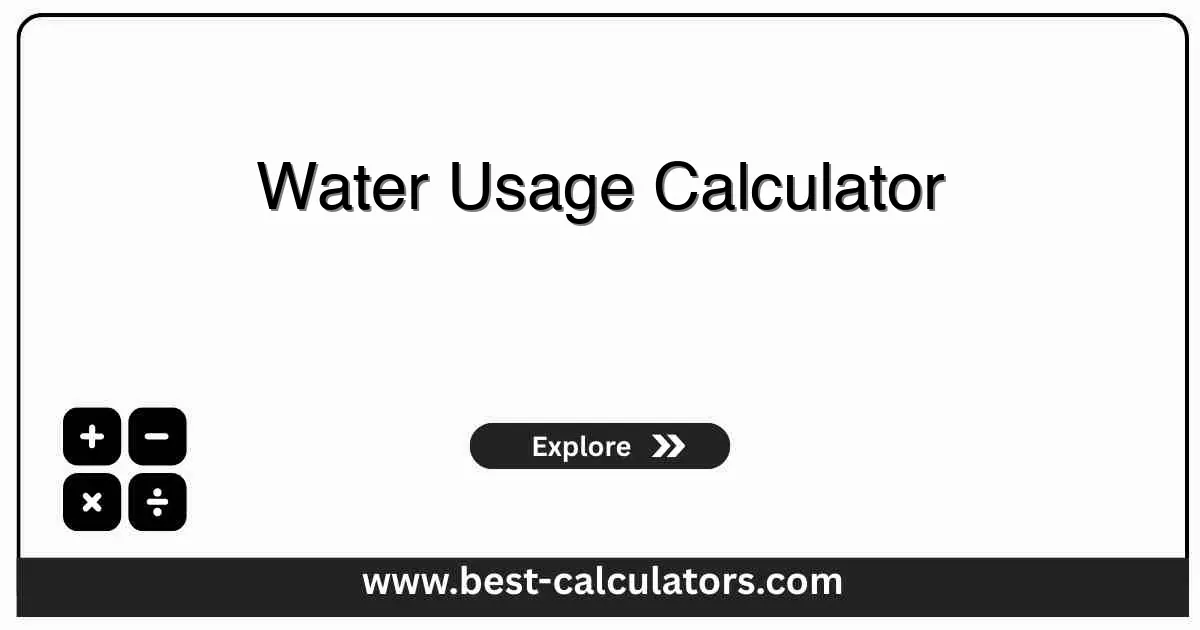Water Usage Calculator - Calculate Household Water Consumption & Costs
Track your daily water usage, calculate monthly costs, and measure environmental impact for showers, laundry, dishes, and household activities
Water Usage Calculator
Your Water Usage
What is a Water Usage Calculator?
A water usage calculator is a free environmental tool that helps you track and analyze your household water consumption patterns. It calculates daily, weekly, and monthly water usage based on your specific habits and activities.
This calculator is designed for:
- Homeowners - Track and reduce water bills
- Property Managers - Monitor building water usage
- Environmental Advocates - Measure conservation impact
- Families - Teach water conservation habits
Related Environmental Tools:
Water heating and treatment contribute to your carbon footprint - calculate your total emissions with our Carbon Footprint Calculator.
Consider solar panels to reduce the energy cost of water heating with our Solar Panel ROI Calculator.
How Water Usage Calculation Works
The calculator uses standard water usage rates:
Standard usage rates include:
- Showers - 2.5 gallons per minute
- Toilet Flushes - 1.6 gallons per flush
- Washing Machine - 25-40 gallons per load
- Dishwasher - 6 gallons per load
Key Water Conservation Concepts
Water Footprint
Total volume of freshwater used to produce goods and services consumed by an individual or household
GPM / GPF
Gallons Per Minute (faucets/showers) and Gallons Per Flush (toilets) - key efficiency metrics
Low-Flow Fixtures
Devices designed to use less water while maintaining performance (1.5-2.0 gpm showerheads, 1.28 gpf toilets)
Greywater
Gently used water from sinks, showers, and washing machines that can be reused for irrigation
Common Mistakes to Avoid
1. Not Fixing Leaky Faucets and Toilets
A leaking faucet dripping once per second wastes 3,000 gallons per year. A running toilet can waste 200 gallons per day - more than most people use daily!
2. Leaving Water Running
Leaving faucets running while brushing teeth (3 gallons) or washing dishes (15+ gallons) wastes thousands of gallons yearly. Turn off the tap!
3. Taking Long Showers
Every minute in the shower uses 2.5 gallons (standard) or 1.5 gallons (low-flow). A 15-minute shower = 37 gallons! Aim for 5-8 minutes.
4. Running Half-Full Loads
Half-full dishwashers and washing machines waste water and energy. Wait for full loads, or use partial-load settings if available.
5. Overwatering Lawns and Gardens
Watering during midday heat causes 30% evaporation. Water early morning or evening. Use drip irrigation to save 50% vs. sprinklers.
6. Not Using Rain Barrels
A single rain barrel can save 1,300 gallons during peak summer months. Free water for gardens and outdoor cleaning!
7. Ignoring Appliance Efficiency
Old appliances use 2-3x more water than modern efficient models. Upgrading can save 6,000+ gallons per year per appliance.
How to Use This Calculator
Enter Daily Habits
Input showers, laundry, and dishwashing frequency
Add Bathroom Use
Include toilet flushes and faucet usage
Include Other Usage
Add baths and outdoor watering
Get Results
View usage breakdown and cost analysis
Benefits of Tracking Water Usage
- • Cost Savings: Identify high-usage activities to reduce water bills.
- • Environmental Impact: Understand your contribution to water conservation.
- • Conservation Awareness: Make informed decisions about water usage.
Factors That Affect Your Results
Household Size
Larger households naturally use more water for daily activities
Appliance Efficiency
Energy-efficient appliances use less water than older models

Frequently Asked Questions (FAQ)
Q: How much water does the average household use per day?
A: The average American household uses about 300-400 gallons of water per day, depending on household size, habits, and local water rates. This calculator helps you track and optimize your specific usage.
Q: What are the biggest water users in a typical home?
A: The largest water users are typically showers (20-30%), toilets (25-30%), washing machines (15-20%), and faucets (15-20%). Outdoor watering and dishwashers also contribute significantly to total usage.
Q: How can I reduce my household water usage?
A: Install low-flow showerheads and faucets, fix leaky toilets, use water-efficient appliances, take shorter showers, collect rainwater for outdoor use, and be mindful of daily water consumption habits.
Q: What is considered high water usage?
A: High water usage is typically over 400 gallons per day for a household of 4, or over 100 gallons per person per day. This can significantly impact both your water bill and environmental footprint.